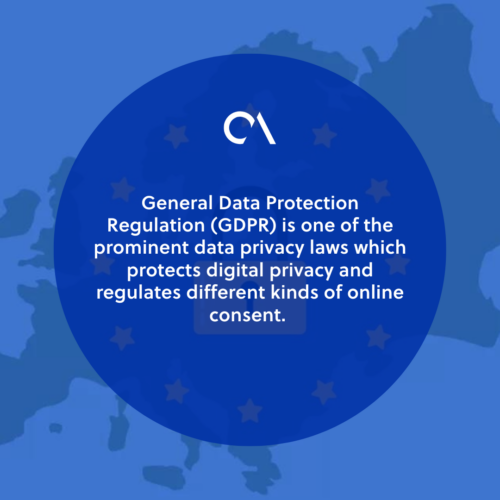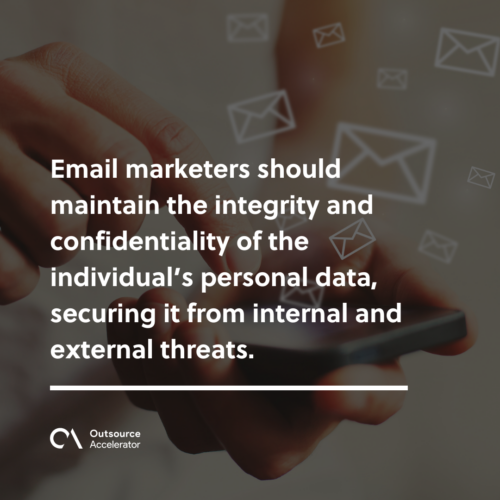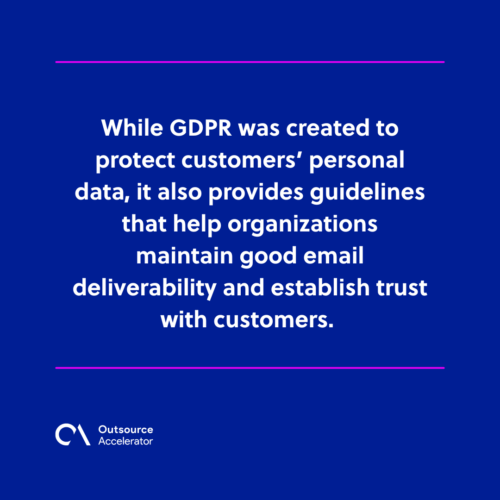GDPR email marketing: What you need to know

In today’s business world, email is one of the most used communication channels.
As email marketing progresses, businesses are now making an effort to comply with some legislation to ensure personal data practices.
This resulted in the implementation General Data Protection Regulation (GDPR)[1] in email marketing. With GDPR coming into effect, organizations adjust their email marketing campaign strategy for compliance.
In this article, we’ll feature how GDPR email marketing works, its seven principles, and the best practices for optimizing email marketing for GDPR.
What is the GDPR?
General Data Protection Regulation (GDPR) is one of the prominent data privacy laws[2] which protects digital privacy and regulates different kinds of online consent.
It was launched in 2018, and it applies to organizations operating under the European Union (EU). GDPR has a significant impact on companies, especially on their departments with direct marketing purposes.
Failure to comply with these regulations results in a fine of up to €20 million or $24.1 million, equivalent to 4% of annual global turnover.
GDPR encourages email marketers to adhere to the best practices and provide their subscribers with a better service.
These data protection laws consist of provisions that empower users in terms of the collection and management of their personal information. Among these provisions include:
- The right to consent to data collection
- The right to understand why and how the data is being used
- The right to request for eliminating information under certain circumstances
Marketing departments were required to comply with the set of rules when investing in their digital marketing efforts, such as email marketing campaigns or email lists.

7 principles of GDPR
There are seven principles of GDPR that can give marketers a clear concept of complying with its requirements.
1. Lawfulness, fairness, and transparency
Organizations must collect and process all the data lawfully. The concept of lawfulness is laid out in GDPR, where asking for consent and fulfilling legal obligations is necessary.
Fairness is about not undermining any data from individuals whose information you’re using. Thus, you must not misuse and mishandle the data collected. Transparency should be clear and open with the data and its purpose.
2. Purpose limitation
According to the GDPR, companies should collect and process data “for specified, explicit, and legitimate purposes” only.
In email marketing, a privacy policy must be clearly communicated to users. Using the collected data for many purposes violates the GDPR guidelines.
3. Data minimization
Data minimization is collecting data that is relevant to your purpose. For instance, to gather subscribers for your email newsletter, you should collect email addresses and avoid irrelevant information such as addresses or phone numbers.
4. Accuracy
It is up to the companies to ensure the accuracy of the personal data collected.
Thus, it is vital to set up checks and audit the stored data periodically. This is relevant for updating and removing incorrect or incomplete data from the database.
5. Storage limitation
As per the GDPR rule, data must be deleted after a certain period of time. Utilizing data from only a specified timeline saves companies from penalties.
The data retention period is a way to meet the storage limitation policy.
6. Integrity and confidentiality
Email marketers should maintain the integrity and confidentiality of the individual’s personal data, securing it from internal and external threats.
GDPR encourages organizations to adopt proper measures to protect data from unlawful processing, security breaches, destruction, damage, or accidental loss.

7. Accountability
The last principle in GDPR for email marketing is the level of accountability. Companies encourage having appropriate measures and proper documentation as proof of compliance with the GDPR guidelines.
This evidence helps GDPR regulators understand if businesses comply with GDPR, which helps avoid penalties.
This principle is also critical in the event of a data breach.
Best practices in optimizing email marketing for the GDPR
GDPR, at its core, is data protection. Email marketers must get the individual’s consent before sending an email. There are huge amounts of fines for GDPR violations.
Most businesses struggle to achieve GDPR compliance, which involves email marketing campaigns. Here are the best practices marketers can follow for GDPR email compliance.
Check your email marketing service provider
As an email marketer, the first important thing to do is to find out what specific tool the email marketing platform will give a significant benefit.
Your email marketing software must-have features that ensure GDPR compliance. Companies may pick a self-hosted email marketing automation tool that allows them to manage data to stay GDPR compliant.
Obtain explicit consent from the subscribers
Getting informed consent from email subscribers about their personal data is another important aspect of the GDPR. As per regulation, this explicit consent must be “freely given, specific, informed, and unambiguous.”
Enable the opt-out option
In this case, GDPR enables users to withdraw consent. This means existing customers should be able to unsubscribe from receiving marketing emails and request the deletion of their information at any time.
Email marketing service providers should let the users easily configure the unsubscribe options.
Once the user unsubscribes, marketers remove them from the email list and delete all the data stored on the data subject for marketing purposes.
Review data retention practices
Marketers are encouraged to retain data securely and delete it when it is no longer needed. Some large organizations are required to create a data retention policy.
An important point of this GDPR email marketing practice is to minimize the stored customer data. For instance, businesses’ email marketing campaigns must have a legitimate reason to store their subscribers’ email addresses.
Why GDPR email marketing compliance matters
While GDPR was created to protect customers’ personal data, it also provides guidelines that help organizations maintain good email deliverability and establish trust with customers.
GDPR is important to all forms of digital marketing and anywhere that collects data. As for email marketing, marketers must obey the data protection law. Complying with this can significantly save you from potential fines.
That said, GDPR email marketing ensures effective email marketing campaigns, which help in growing business.
These rules set high data protection and consent standards, which will have a huge impact on your business as well as the marketing industry.

Article References:
[1] General Data Protection Regulation (GDPR). Hoofnagle, C.J., van der Sloot, B. and Borgesius, F.Z. (2019). The European Union general data protection regulation: what it is and what it means. Information & Communications Technology Law, [online] 28(1), pp.65–98.
[2] Data privacy laws. Krishnamurthy, V. (2020). A Tale of Two Privacy Laws: The GDPR and the International Right to Privacy. AJIL Unbound, 114, pp.26–30.







 Independent
Independent




